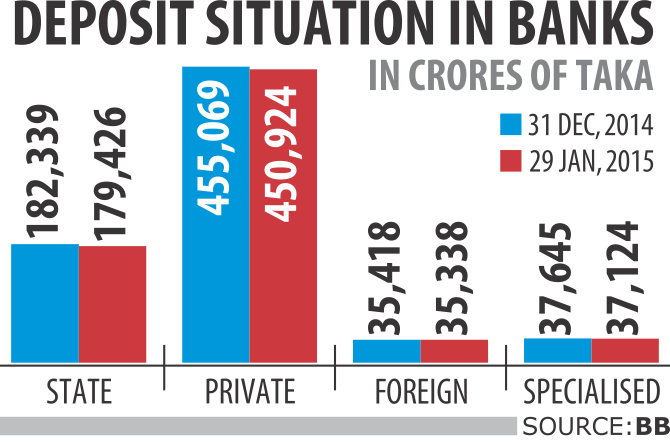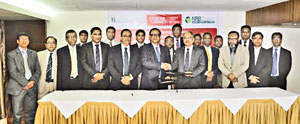Banking
Banks' deposits fall as savers rush to savings tools

Deposits at banks dipped 1.07 percent in January from a month ago as savers rush to government savings schemes that offer higher interest rates compared to the banking system.
Total deposit at the country's 56 banks was Tk 702,814 crore as of January 29 this year, down by Tk 7,658 crore from Tk 710,472 crore in December 31 last year.
Bankers said banks have been lowering interest rates on deposits for nearly two years due to dull investment situation.
The weighted average interest rate on bank deposits was 7.32 percent in November last year, which was 8.45 percent in the same month a year ago.
Interest rates on term deposits at private banks are as high as 9.50 percent while it is 8.50 percent at state banks.
On the other hand, interest incomes on savings certificates range between 11 percent and 13.50 percent.
“So, the savers are now getting more interested in savings certificates rather than putting money in banks,” said Anis A Khan, managing director of Mutual Trust Bank.
In the five months to November of the current fiscal year, gross sales of saving instruments went up by a staggering 82 percent compared to the same period a year ago.
Banks have been sitting idle on huge piles of cash for a long time, as they could not make new investments.
Their investment situation worsened further in January because of the blockades and strikes as businesses and companies have put their borrowing plan on hold.
As a result, banks now have more liquidity in their hands and are not interested to take costly deposits, bankers said.
Khondkar Ibrahim Khaled, a former deputy governor of Bangladesh Bank, blamed the decline in banks' deposits on the seasonal effect. He said sometimes bank branches collect “hot deposits” from their existing clients in December to reach their collection target set by their head offices.
“These hot depositors can withdraw their money after December 31,” he said.
In the absence of social safety nets, the government offers higher yields on savings certificates in order to provide an income to limited-income people and elderly citizens, who are highly dependent on such sources of earning.
A number of bankers say the ongoing political unrest, which began on January 6, also hit the deposit growth.
A section of savers are withdrawing their deposits from banks to buy things, in bulk, whose prices might go up in the coming weeks amid growing uncertainty that the present situation, which has disrupted the supply chain, might linger.
There are also a section of savers who use debit cards to withdraw money from their bank accounts when needed. Savers have withdrawn large amount of money from banks, as many ATMs across the country went out of cash in January due to blockades.
The effect of such withdrawal will not be that much significant, said Khan of Mutual Trust Bank.
Bank-wise, deposits at state lenders went down by 1.59 percent in January compared to December, according to statistics from Bangladesh Bank.
The fall is 0.90 percent at private banks, 0.22 percent at foreign banks and 1.38 percent at state-run specialised banks.
The decline in the specialised banks was caused largely by the 3.18 percent decrease in deposit growth at scam-hit BASIC Bank.
Year-on-year deposit growth also slowed in January. It was 12.58 percent in January 29 this year, which was 13.26 percent in December 31 last year.
News:The daily Star/23-Feb-2015New banks go for risky lending
New banks are lending out heavily -- 70 to 80 percent of their total loans -- to corporate clients instead of small and medium enterprises and retail consumers, insiders and analysts said.
The risk is: if a big client fails to pay back in time, the bank may suffer as it may not be able to make adequate provision from its small profit.
“Directors want quick profits, which is very unlikely for a new bank,” said the chief executive of a new bank, seeking anonymity. “It takes at least three to five years to generate sustainable profits and pay dividends.” Nine new banks that came to the market amid political unrest in the second half of 2013 are struggling to do business at present, facing intense competition from 47 old banks in lending and attracting deposits.
Lending out is the biggest challenge for a new bank, as borrowers demand the lowest interest rate without considering the banks' cost of funds.
According to these banks, the cost of their funds is between 11 percent and 12 percent, which is well within a single digit for many old banks. In terms of lending, if a new bank offers a borrower 11 percent, an old bank offers 10.5 percent.
“Depositors have high expectations from us, while borrowers want the lowest rate in the market. We are in a double bind,” said Rafiqul Islam, managing director of South Bangla Agriculture and Commerce Bank (SBAC).
Moreover, businesses are passing bad times and it has become impossible to get a good client, who wants to set up new factories or expand the existing ones amid an ongoing anti-business climate, Islam added. SBAC has lent out Tk 1,363 crore in 2014, coming in third among the new banks, after Union Bank with Tk 2,828 crore and NRB Commercial Bank with Tk 1,441 crore.
SBAC booked Tk 32 crore in operating profit and the net profit would be less than Tk 20 crore, which is a tiny figure to pay dividends against Tk 400 crore in capital.
“We need more time, around two years, to pay dividends to our shareholders,” said the SBAC chief executive.
To make their directors happy, some banks are lending aggressively to corporate clients that may end up as bad loans.
Union, NRB Commercial, SBAC and NRB Global went for aggressive banking, their lending data shows.
“Around 80 percent of our loans have gone to corporate clients,” said an official of Union Bank. It is tough for a new bank to lend out Tk 100 crore, especially to small businesses, he said, adding that strict monitoring is also needed to recover the money from small borrowers.
Muklesur Rahman, managing director of NRB Bank, said, “We are doing progressive banking, not aggressive, to make us sustainable. We have to keep in mind that we do business with depositors' money.” NRB lent out Tk 620 crore until December 2014.
Modhumoti Bank looks more cautious among the nine entrants. It lent out only Tk 413 crore until the end of 2014.
Salehuddin Ahmed, a former central bank governor, said he had always opposed issuing licences to new banks during his tenure till May 2009 as the country and the economy do not need any new banks.
“Many of these new banks have no sustainable and long-term business vision. Many sponsors of these banks do not even understand the banking business,” Ahmed said.
“That's the reason why the directors of these new banks want profit in one or two years.”
New banks could create entrepreneurs by funding SMEs and other productive sectors, he said.
News:The Daily Star/23-Feb-2015ONE Bank Limited
 ONE Bank Limited signed a memorandum of understanding (MoU) with Grand Sultan Tea Resort & Golf Resort, Srimongal recently. Head of Retail Banking of the bank Gazi Yar Mohammed and Head of Sales & Marketing of Grand Sultan Tea Resort & Golf Md Sayedul Islam Bhuiyan signed the MoU on behalf of their respective organisations. Under the MoU, OBL credit cardholders and OBL employees will enjoy up to 55 per cent discount on rack room rents upon exhibiting their respective credit cards or employees ID card.
ONE Bank Limited signed a memorandum of understanding (MoU) with Grand Sultan Tea Resort & Golf Resort, Srimongal recently. Head of Retail Banking of the bank Gazi Yar Mohammed and Head of Sales & Marketing of Grand Sultan Tea Resort & Golf Md Sayedul Islam Bhuiyan signed the MoU on behalf of their respective organisations. Under the MoU, OBL credit cardholders and OBL employees will enjoy up to 55 per cent discount on rack room rents upon exhibiting their respective credit cards or employees ID card.
Mercantile Bank Limited
 Mercantile Bank Limited has recently commenced Xpress Money Remittance Service at all the branch outlets of NRB Commercial Bank Ltd. An agreement was signed in this regard between NRB Commercial Bank Ltd. and Mercantile Bank Limited. Managing Director & CEO of Mercantile Bank Limited M Ehsanul Haque and Managing Director & CEO of NRB Commercial Bank Ltd Dewan Mujibur Rahman signed the agreement on behalf of their respective banks.
Mercantile Bank Limited has recently commenced Xpress Money Remittance Service at all the branch outlets of NRB Commercial Bank Ltd. An agreement was signed in this regard between NRB Commercial Bank Ltd. and Mercantile Bank Limited. Managing Director & CEO of Mercantile Bank Limited M Ehsanul Haque and Managing Director & CEO of NRB Commercial Bank Ltd Dewan Mujibur Rahman signed the agreement on behalf of their respective banks.
Atiur for more SME financing by banks
Bangladesh Bank Governor Atiur Rahman has strongly advocated more lending to small and medium enterprises (SMEs) by commercial banks for promoting inclusive growth.
The governor said the Basel Rules imposing higher capital charges on bank lending to SMEs are viewed as riskier than larger corporates, and to some extent as a disincentive for commercial banks. However, he noted that the substantially higher interest the banks earn on SME loans is well enough to cover the marginally higher capital charge related costs, reports BSS.
Rahman came up with the recommendation and observation while making some points at a session on promoting SME development at a high-profile conference titled ‘Frontier and Developing Asia: Supporting Rapid and Inclusive Growth’, held yestersday at the JICA Research Institute in Tokyo, Japan, said a BB press release.
The International Monetary Fund (IMF) and Japan International Cooperation Agency (JICA) jointly organised the seminar, inaugurated by JICA president Akihito Tanaka and IMF Deputy Managing Director Naouki Shinohara.
State Minister for Planning and Finance MA manna attended the inaugural session. Ganeshan Wignaraja, Director of Research of the Asian Development Bank Institute (ADBI), presented the keynote paper. The conference was also participated by finance ministers and governors of some Asian countries.
JICA president welcomed participants with a plea for Financial and reducing inequality through SME development.
The governor said non-bank alternative options of financing through global and local non-banking financial institutions (NBFIs) and microfinance institutions (MFIs) are already in varying extents of use.
Factoring or trading in SME receivables, is also helping SMEs in Bangladesh and elsewhere by providing liquidity against their credit sales to upstream buyers in supply chains, reducing their needs for direct financing.
“All these options are feasible and well worth promoting in the menu of options for fuller catering to SME financing needs, suitably adapted to specific country environments. However, in no way do these alternatives absolve commercial banks from their onus of engagement in socially beneficial SME lending on the plea of marginally higher costs from Basel Rules related capital charges”, Rahman said.
He advised that the culture in mainstream global commercial banking needs a major reorientation towards socially responsible inclusive financing, supporting SMEs and environmentally benign ‘green’ output initiatives.
Sharing Bangladesh experience, the governor said SME financing by banks and NBFIs now comprises nearly a third of total credit, which helped uphold domestic output and domestic demand amid global growth slowdown during and following the global financial crisis.
He said the Department for International Development (DFID) of the United Kingdom would launch a partial credit guarantees for SME lending, which would encourage more SME financing by banks.
Besides banks’ lending to SME, the governor suggested deeper fiscal and monetary policy coordination for desired growth of SMEs, which would eventually promote inclusive growth.
Ganeshan Wignaraja in his keynote paper identified the role the Asian SMEs in output and trade activities, and of the financing and other challenges they face in fuller realisation of their potentials.



